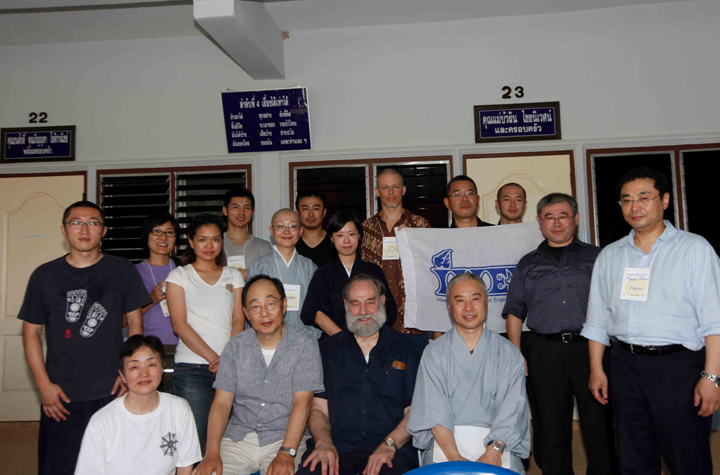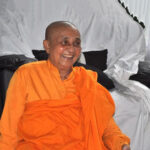by Jonathan Watts

The 2009 INEB conference saw an unprecedented representation of Japanese engaged Buddhists. Since the dissolution of INEB Japan with the death of Rev. Suzuki Ryowa in 2004 and the gradual withdrawal of other members from INEB activities, Japanese participation has been slight over the past three conferences. This small number also reflecting problems among Japanese Buddhists in understanding INEB and the nature of more radical socially engaged Buddhism that goes beyond the kinds of overseas aid and relief activities which many Japanese engaged Buddhist groups have been active in previously. However, in the past 3-4 years, a new growing movement of grassroots Buddhist activists, many of them priests and nuns, has emerged in Japan to confront urgent domestic problems within Japan, like suicide, youth problems, caring for the elderly and dying, and poverty and homeless. The sudden dynamism of this movement shows simply in that at the INEB Conference in Taiwan, only two Japanese participated, but just two years later, we easily assembled a group of eighteen participants.
These participants represented some friends from the Japanese Buddhist NGO movement, which focuses more on overseas aid work, who have had some contact with INEB over the years, such as Rev. Yoshiharu Tomatsu (terminal care), Rev. Hidehito Okochi (environment), and Ms. Mika Edaki (gender and Burma) all from the AYUS Network of Buddhists Volunteers on International Cooperation, as well as Mr. Shinichi Noguchi from the Niwano Peace Foundation. There was also a group of newer participants, many of them young, who are working on the above-mentioned domestic problems, such as Rev. Jotetsu Nemoto, Rev. Eka Shimada, and Rev. Yukan Ogawa, all from the Association of Priests Grappling with the Suicide Problem. There was also a new Japanese member of the Advisory Committee, Prof. Hisashi Nakamura of Ryukoku University, and of the Executive Committee, Rev. Masazumi Okano of the International Buddhist Exchange Center. Finally, we welcomed back after many years absence Rev. Jokei Majima from INEB Japan who specializes in Burma issues.

The group as a whole convened for a full afternoon of discussion on the first day of the main conference. Our talks focused on sharing our viewpoints on pressing social issues in Japan and in Japanese Buddhism and how to develop engaged Buddhist responses to them. Then in spontaneous response to lunch time discussions, we came together with the groups from Korea and Taiwan and held the first such East Asian regional group meeting at an INEB Conference. Together we shared the particular issues and problems facing each country and each Buddhist tradition. While there are a number of common social issues, it was interesting to see how strong Taiwanese Buddhism is as a public force, while Korea Buddhism has been marginalized by Christianity and Japanese Buddhism has been marginalized by secularism.
In the end, the conversations were so interesting and vast that we decided to move forward with planning the first INEB East Asia Forum, which will be held in Tokyo from April 5-7, 2010. At this meeting, we will take more intensive time to share our different social and religious issues. Further, the host country, this time Japan, is arranging for a variety of exposure sessions and special talks on the issues of suicide, gender, poverty and homelessness, and the lingering effects of World War II. The plan is to hold this meeting in years between the main INEB Conference on the basis of rotating host countries. Since in INEB we try to emphasize intimacy and human relationship, this meeting will be small with only 40 participants total so that we can get to know each other more deeply.

Besides these activities at the main conference, the Japanese participants had a wide variety of experiences over the full week program. Four of the young priests join ed the pre-conference meditation retreat. They shared their own tradition of chanting with us during the morning service of the last day; became great fans of Master Soon?s morning tai-chi; and although all four are from the Japanese Pure Land tradition that practices chanting rather than meditation, they developed an interest in the different types of meditation taught during the retreat. A number of Japanese participants also took active roles in the different parts of the main program. Rev. Majima, who brought four Burmese living in Japan, and Mika Edaki became integral members in the discussion and strategy sessions on Burma. Prof. Nakamura and Mr. Noguchi were very active in the GNH and Buddhist economics discussions. We?d like to offer a special thanks to Mr. Noguchi?s Niwano Peace Foundation who provided support for the delegates from Bhutan to attend the conference. There was also a special separate meeting held between the priests involved in suicide prevention and some of the Sri Lankan participants also involved in suicide prevention work. It is hoped that this dialogue will develop into some type of future collaboration. In the days after the conference, a number of the Japanese participants, such as Revs. Nemoto, Kobayashi, Takase, and Midorikawa, participated in the International Alms Round for Social Justice, which helped raise medical donations for Burmese refuges and immigrant workers in Thailand. Finally, we had a very special group of four Japanese cooks, led by Chef Yoshiko Hondo, who provided traditional Japanese cuisine during the main conference and also at final public symposium in Chiang Mai city. Their amazing energy and always-cheerful demeanor as well as their delicious food made them exceptional ambassadors from their country.
As mentioned at the beginning, this conference marked an unprecedented level of Japanese participation with a high level of diversity from young to old, male and female, ordained and lay, representing a broad variety of interests. It is hoped that this positive experience, which is now leading to the first INEB East Asian Forum, will lead to not simply regular participation at the INEB Conference but an increasing involvement in INEB related activities, for example, inclusion of the young priests in the INEB Youth programs, leadership in the INEB Burma and Buddhist Economics activities INEB Conferenceand finally, perhaps, innovative leadership in new areas such as suicide counseling and grief care.






